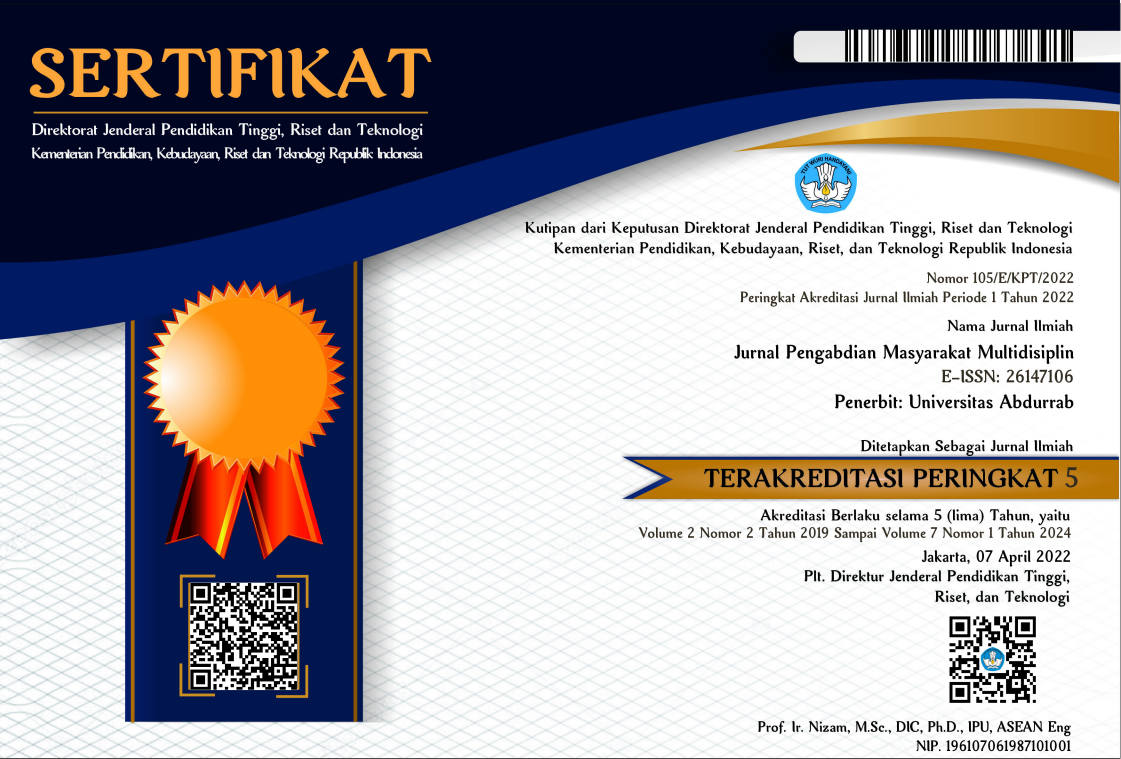PELATIHAN PENGOLAHAN LIMBAH PERTANIAN DI DESA NGEPOSARI
Abstract
One potential source of biomass energy to be processed is agricultural waste. Seeing the potential of corn cultivation owned by the people of Ngeposari Village, corn waste processing is considered to have opportunities in economic terms. Corn weevils have been used by residents to make embers without further processing. Household waste and agricultural waste often harm society. Waste that is a leftover or discarded product is always considered unusable. The existing waste accumulates and has a negative effect. Proper processing of waste can open up new business opportunities. Agricultural waste is one biomass energy source with high selling value but has yet to be widely utilized. The service team offers solutions to revive UMKM in Ngeposari Village, Gunung Kidul, and increase community business opportunities through this service program. Several pieces of training were conducted to increase the skills of residents, namely training in making briquettes from corn stalks and training in making organic fertilizer.
References
A. Zunaidah, E. Askafi, and A. Daroini, “Peran Usaha Bumdes Berbasis Pertanian Dalam Upaya Meningkatkan Kesejahteraan Masyarakat,” Manaj. Agribisnis J. Agribisnis, vol. 21, no. 1, pp. 47–57, 2021.
R. Idayu, M. Husni, and S. Suhandi, “Strategi Pengembangan Usaha Mikro Kecil dan Menengah (UMKM) Untuk Meningkatkan Perekonomian Masyarakat Desa di Desa Nembol Kecamatan Mandalawangi Kabupaten Pandeglang Banten,” J. Manaj. STIE Muhammadiyah Palopo, vol. 7, no. 1, pp. 73–85, 2021.
A. A. ad Sonief, “Digitalisasi Industri Kecil Dan Produk Pertanian Daerah Upaya Untuk Pemberdayaan Masyarakat Di Desa Karangbendo Kecamatan Rogojampi Kabupaten Banyuwangi,” J. Innov. Appl. Technol., vol. 5, no. 1, pp. 842–847, 2019.
L. E. Wardani, G. Prayitno, A. Yudono, R. Rahmawati, and A. Auliah, “Pengembangan Usaha Mikro Kecil Dan Menengah (Umkm) Berbasis Partisipatif Bagi Masyarakat Desa,” JCES (Journal Character Educ. Soc., vol. 3, no. 2, pp. 414–431, 2020.
M. Gusman, A. Octova, and D. Yulhendra, “Produksi Briket Arang Dengan Pemanfaatan Limbah Tongkol Jagung Di Desa Kampung Tangah Kecamatan Lubuk Basung,” Bina Tambang, vol. 3, no. 3, 2018.
Y. S. Pramesti, B. Kristanto, and H. Pratama, “Pengolahan Limbah Tongkol Jagung menjadi Briket Menggunakan Mesin Press Tongkol Kapasitas 40 kg/jam,” Procedia Egineering Life Sci., vol. 1, no. 1, pp. 1–6, 2021.
G. D. Kandou, S. A. S. Sekeon, and P. C. Kandou, “Pengolahan Limbah Organik Rumah Tangga Melalui Pengembangan Ekoenzim Di Kecamatan Singkil Kota Manado,” Paradig. SEHAT, vol. 9, no. 3, pp. 1–4, 2021.
S. B. Aji, M. Muharram, and S. Z. Rahmawati, “Inovasi Pengolahan Bonggol Jagung Menjadi Briket Arang di Desa Ngampel, Kecamatan Papar, Kabupaten Kediri,” JATIMAS J. Pertan. dan Pengabdi. Masy., vol. 2, no. 1, pp. 29–37, 2022.
Suryandari NI, Hapsari TD. Sistem Produksi Pupuk Organik Padat (POP) Pada PT. Sirtanio Organik Indonesia di Kabupaten Banyuwangi. UNEJ e-Proceeding. 2019 May 5

This work is licensed under a Creative Commons Attribution-NonCommercial-ShareAlike 4.0 International License.
1. Copyright of all journal manuscripts is held by the Jurnal Pengabdian Masyarakat Multidisiplin.Formal legal provisions to access digital articles of electronic journal are subject to the provision of the Creative
2. Commons Attribution-ShareAlike license (CC BY-NC-SA), which means that Jurnal Pengabdian Masyarakat Multidisiplin is rightful to keep, transfer media/format, manage in the form of databases, maintain, and
3. publish articles.Published manuscripts both printed and electronic are open access for educational, research, and library purposes. Additionally, the editorial board is not responsible for any violations of copyright law.
licensed under a Creative Commons Attribution-ShareAlike 4.0 International License.
 PDF (Bahasa Indonesia)
PDF (Bahasa Indonesia)
 Abstract views: 404
Abstract views: 404
 downloads: 318
downloads: 318

 :
:




